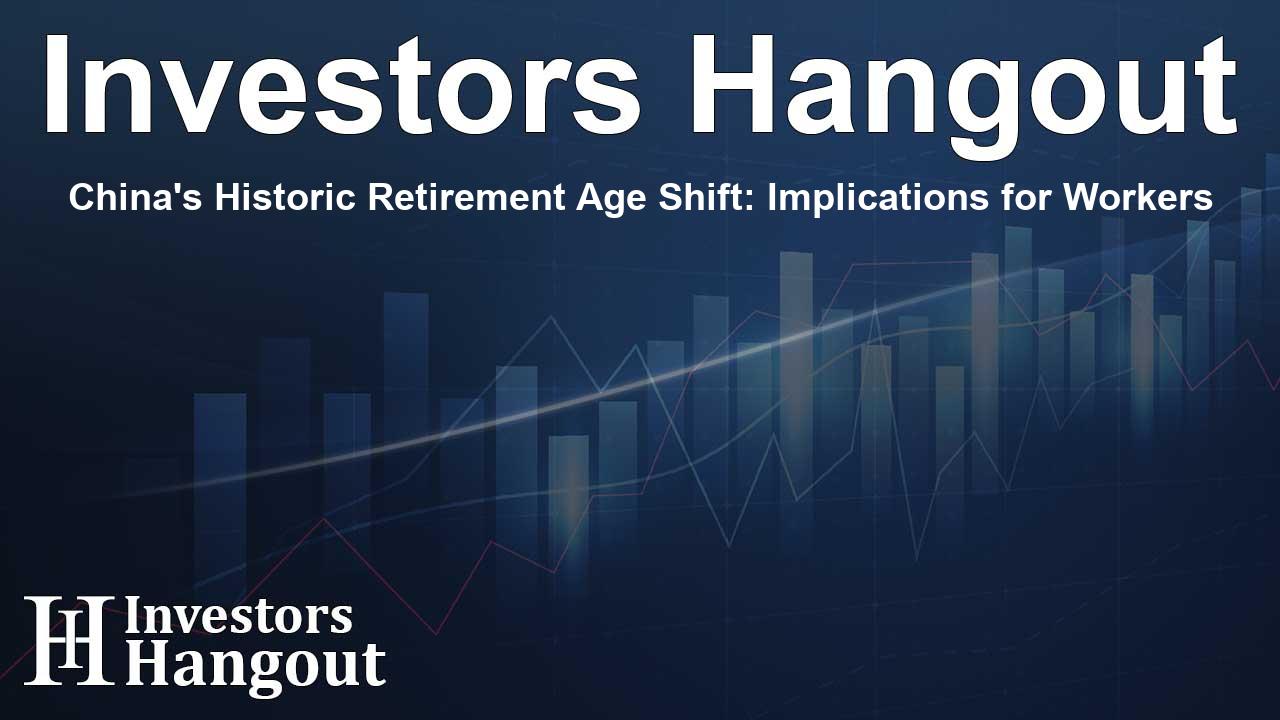China's Historic Retirement Age Shift: Implications for Workers

China's Retirement Age Adjustment: A Transformative Step
For the first time since 1978, China has unveiled a significant change to its retirement age policy. This new direction aims to tackle the challenges posed by a declining labor force, which has become especially urgent due to the country's aging population and slowing economic growth.
Understanding the Changes to Retirement Age
Recent reports indicate that top lawmakers have approved a plan to raise the retirement age. Now, men will retire at 63 instead of 60, while regular female workers will retire at 55 rather than 50. For women in management roles, the retirement age will increase from 55 to 58. This change is set to take effect in January and will be gradually implemented over the next 15 years.
Balancing Productivity and Public Sentiment
This important shift aims to boost productivity amid demographic changes as the nation seeks to support its growing elderly population. However, it may lead to dissatisfaction among workers who are already facing economic hurdles.
Michelle Lam, an economist at Societe Generale SA, noted that the gradual increase in retirement age shows policymakers are aware of the potential for societal discontent, particularly in light of slowing economic growth.
The Immediate Impact on Health and Elderly Care Industries
Interestingly, shares of health and elderly care companies surged following this announcement. For instance, Shanghai Everjoy Health Group Co. soared by the daily limit of 10%, and other businesses in the sector also experienced notable growth. Experts believe that as the retirement age rises, the demand for elderly care services is expected to grow, which will likely encourage investments in health infrastructure.
The Long-term Necessity of Financial Adjustments
China currently has one of the world’s lowest retirement ages, especially when you consider the significant increase in life expectancy over the past several decades. This adjustment seeks to ease the financial burden on the government by broadening the tax base and postponing pension benefits amid a rapidly growing elderly demographic.
The move aligns with the goal of maximizing human resources in a country facing demographic challenges. Still, the initiative has drawn mixed reactions, with many expressing concerns about the job competition older workers may encounter.
Concerns Raised by Citizens
Many have voiced fears about how the increased retirement age might impact their job prospects. A significant commentary on social media highlighted the tough job market that older individuals might face as they compete with younger candidates. There's also a genuine concern about potential biases employers may have against hiring older applicants.
Government’s Approach to Rising Concerns
The government is aware of these concerns and has stressed that the gradual rollout of these changes will help minimize negative effects on job opportunities for younger workers. Additionally, beginning in 2030, workers will need to contribute to their pension accounts for a longer period—rising from 15 to 20 years—before they qualify for benefits.
Planning for the Future: Addressing Demographic Challenges
As life expectancies continue to rise in China, adapting the retirement age policy has become essential to addressing demographic challenges stemming from decades of the one-child policy. Currently, the average life expectancy in China is 78 years, up from 66 years four decades ago.
By 2035, it’s anticipated that those aged 65 and older will make up 30% of the population, a significant increase from 14.2% in 2021. Despite various government efforts to encourage higher birth rates, including several initiatives, statistics indicate a substantial decline in births. Thus, achieving a balanced demographic profile will require considerable planning and effort.
In summary, the recent changes to China's retirement age policy represent a critical shift aimed at adapting to a changing demographic landscape. This move brings the potential for greater economic stability, but it also presents challenges for the current workforce.
Frequently Asked Questions
What is China’s new retirement age policy?
China is raising the retirement age, with men expected to retire at 63 and women at 55 or 58, depending on their job level. This plan will be rolled out gradually over 15 years.
Why is China raising the retirement age?
This adjustment is designed to tackle labor shortages, boost productivity, and relieve financial strain on the pension system as the elderly population continues to grow.
How will this policy affect health care companies?
Following the announcement, shares of health and elderly care companies spiked, suggesting a predicted increase in demand for elderly care services.
What are the public concerns regarding this policy?
Many citizens are anxious about job competition with younger workers and potential biases against older candidates in the job market.
What changes will occur before 2030?
Before 2030, there will be a gradual increase in the retirement age. Starting in 2030, the requirements for pension contributions will extend from 15 to 20 years.
About The Author
Contact Caleb Price privately here. Or send an email with ATTN: Caleb Price as the subject to contact@investorshangout.com.
About Investors Hangout
Investors Hangout is a leading online stock forum for financial discussion and learning, offering a wide range of free tools and resources. It draws in traders of all levels, who exchange market knowledge, investigate trading tactics, and keep an eye on industry developments in real time. Featuring financial articles, stock message boards, quotes, charts, company profiles, and live news updates. Through cooperative learning and a wealth of informational resources, it helps users from novices creating their first portfolios to experts honing their techniques. Join Investors Hangout today: https://investorshangout.com/
The content of this article is based on factual, publicly available information and does not represent legal, financial, or investment advice. Investors Hangout does not offer financial advice, and the author is not a licensed financial advisor. Consult a qualified advisor before making any financial or investment decisions based on this article. This article should not be considered advice to purchase, sell, or hold any securities or other investments. If any of the material provided here is inaccurate, please contact us for corrections.
